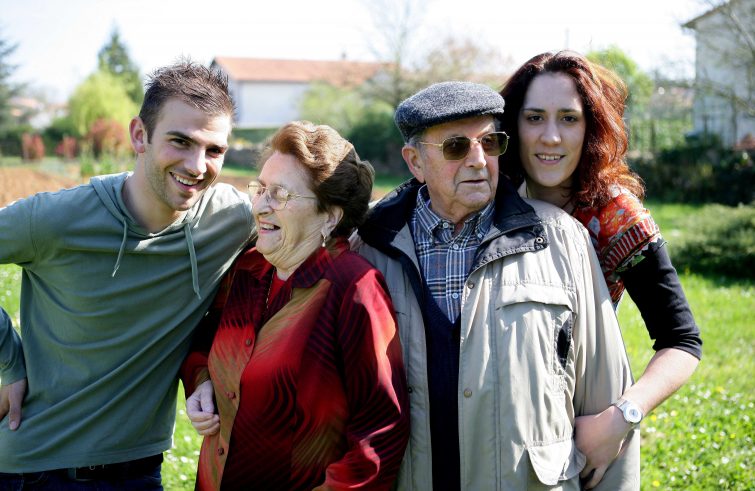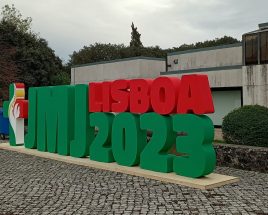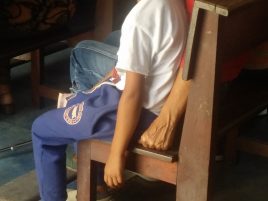
“To you, the young who are preparing to meet in Lisbon or to celebrate World Youth Day in your own countries, I would ask: before you set out on your journey, visit your grandparents or an elderly person who lives alone!”. In his Message for the third World Day of Grandparents and the Elderly, scheduled for 23 July with the theme “His mercy is from age to age” (Lk 1:50), Pope Francis sent out a special appeal to young people. The Pontiff highlighted the close link between the celebration of the World Day of Grandparents and the Elderly and the World Youth Day: “Both celebrations – states Francis – remind us of the ‘haste’ with which Mary set out to visit Elizabeth. In this way, they invite us to reflect on the bond that unites young and old. The Lord trusts that young people, through their relationships with the elderly, will realize that they are called to cultivate memory and recognize the beauty of being part of a much larger history.” This is not the first time that the Pope invokes this cross-generational ‘alliance’ because, as Gabriella Gambino, Undersecretary of the Dicastery for the Laity, Family and Life, told SIR, “without the elderly, young people’s future lacks a crucial part of their growth: the memory of the past, which represents their roots.”
 The World Day of Grandparents and the Elderly (July 23) and the WYD (August 1-6), two events of major ecclesial importance one after the other. The alliance between young and old, so frequently called for by Pope Francis, finds further reverberation in this year’s WYD. What is the fil rouge connecting these two Days?
The World Day of Grandparents and the Elderly (July 23) and the WYD (August 1-6), two events of major ecclesial importance one after the other. The alliance between young and old, so frequently called for by Pope Francis, finds further reverberation in this year’s WYD. What is the fil rouge connecting these two Days?
The theme chosen by Pope Francis for the Third World Day for Grandparents and the Elderly is
“His mercy is from age to age” (Lk 1:50). The Day dedicated to grandparents and the elderly will be celebrated just a few days before the opening of the WYD in Lisbon, with the theme “Mary got up and went in haste.” Both Days, therefore, revolve around the visit of the young Mary of Nazareth to her elderly cousin Elizabeth, the joy of the Magnificat and the solicitude of the young woman visiting an older woman. In his message to the young people leaving for the WYD, the Pope writes, “Mary’s visit and Elizabeth’s greeting open our eyes to the dawn of salvation: in their embrace, God’s mercy quietly breaks into human history amid abundant joy.” The embrace between the two mothers is a sign of great hope that is bestowed upon the world.
In his Message for the forthcoming WYD in Lisbon, Pope Francis defined young people “represent the hope for new unity within our fragmented and divided human family. But only if they can preserve memory, only if they can hear the dramas and dreams of the elderly.” How important is an alliance between young and old so as not to forget history’s lessons?
Without the elderly, the future of young people is missing a fundamental element for their development: the memory of the past, namely their roots.
The symbolic connection between the two Days highlights not only the fact that no one is saved alone because we all create bonds that draw others into our life journey, but above all it reminds us that no one can be saved alone. Our personal history of salvation is rooted in a distant place and time, far before us, which we must learn to reckon with if we are to be strong and self-aware, with the ability to look ahead and build a positive future, for ourselves and for others. The most recent past, scarred once again by vicious wars, by the failure to offer assistance to people forced to flee their homeland and the inability to support the most vulnerable among us, are signs that we have learnt very little from the lessons of history, when such tragedies already occurred.
 How can we help young people to learn the lessons of the past?
How can we help young people to learn the lessons of the past?
We should encourage young people not only to have an awareness and understanding of the past, but also to have the courage to draw from history a prophetic vision of the future, a different understanding of human relations in which universal values such as fraternity, solidarity and, above all, respect for every human life are at the centre. This ability requires a beginning, a genesis, which takes shape when a child sits in front of his grandfather and listens to him in silence, fascinated by the stories of the past that have left a mark and taught a lesson in the life of this grandfather and his family.
This alliance stems from the act of listening, from wonder, from reflection and from a vision.
The Pope described the elderly as ‘a gift’ whose richness is often overlooked. How can young people become a gift for the elderly?
In the Message, the Pope writes, “For the elderly, the presence of a young person in their lives can give them hope that their experience will not be lost and that their dreams can find fulfilment.” Young people provide a stimulus for not dwelling on impending frailty or regretting missed opportunities in life. This has also been our experience. A child can play a key role in ensuring that grandparents or elderly people in the community do not shut themselves away in their own homes, lonely and abandoned, but remain engaged in the community, in the family, and feel part of a context in which they have a voice and a sense of belonging.
In their friendship with a young person, the elderly person can rediscover enthusiasm for a great ideal; awe at the onset of new projects; the joy of the faith and the testimony of a life that becomes a lesson to be learnt by the young generations. The elderly are irreplaceable and ultimately, the message sent out by a young person’s warm gaze and fondness is: Grandpa, I need you!
In today’s world, why is it important for young and old to come together? And what should be the grounds for such an encounter?
The Holy Father has long reminded us of the urgent need for an alliance between generations. For the Pope, it will “save the human family.” We must believe in this and commit ourselves, as a Church and as lay people, to ensuring that this wounded and torn humanity rediscovers hope through the memory and experience that the elderly can offer to the young, in order to avoid repeating the mistakes of the past and to discover a new path together. The wisdom and prudence that should guide our future lives come from the experience of encounter, not from the pride that comes from believing only in oneself and one’s own abilities. Encounter is possible, however, when we see value in others.
In his Message for this year’s World Day for Grandparents and the Elderly, the Pope calls on young people not to leave the elderly alone and to visit them before leaving for the World Youth Day in Lisbon…
This gesture is a concrete expression of the closeness that underlies the beginning of a true and lasting encounter. The Dicastery for the Laity, Family and Life invites all dioceses, parishes, communities and families to be creative in facilitating this encounter. Indeed, it can radiate to the world the joy of God’s mercy.
Following Pope Francis’ invitation, the Dicastery also invites all dioceses, parishes, associations and communities to celebrate the World Day of Grandparents and the Elderly with a solemn Mass with grandparents and the elderly, inviting young people to visit the lonely elderly in their community. On the occasion of WYD, the elderly are invited to pray especially for the young, accompanying them on their pilgrimage to Lisbon. Some pastoral tools for the preparation of the third World Day for Grandparents and the Elderly can be found on the website of the Dicastery: http://www.laityfamilylife.va/.










